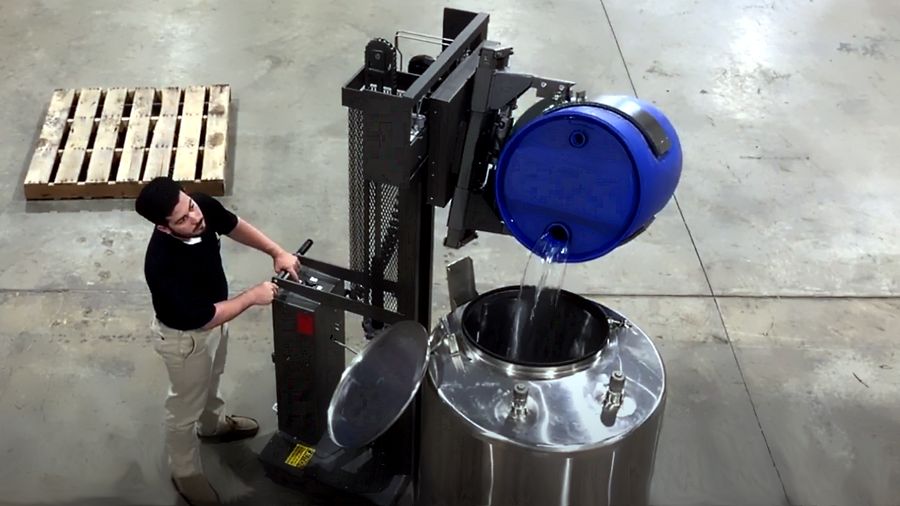Employees often have to handle and transport drums containing chemicals or other hazardous materials when working in a manufacturing facility or warehouse. Improper handling of drums can result in severe injuries, spills, and environmental hazards. Therefore, training employees on proper drum handling techniques and equipment to prevent accidents and ensure their safety is crucial.
This article will discuss the importance of training employees on drum handling techniques and using drum handling equipment in Franklin Lakes NJ. We will also provide some tips on how to train employees on proper drum handling techniques and equipment used in NJ.
Why is training essential for proper drum handling?
The Occupational Safety and Health Administration (OSHA) requires employers to train their employees who handle drums properly. OSHA has strict guidelines and regulations in place to prevent workplace accidents and injuries. Therefore, training employees on proper drum handling techniques and equipment use is not only necessary but also a legal requirement.
Besides meeting regulatory requirements, training employees on proper drum handling techniques has several benefits. It ensures the safety of employees, minimizes the risk of environmental hazards, and protects the company’s reputation. Additionally, well-trained employees can handle drums more efficiently, reducing the likelihood of accidents and improving productivity.
Drum handling equipment in NJ: Types and Uses
Drum handling equipment in NJ can help employees move, lift, and transport drums safely and efficiently. The type of drum handling equipment used depends on the size. And weight of the drum, the material it contains, and the distance it needs to be moved.
Some of the most common drum handling equipment used in NJ include:
-
Drum dollies: Drum dollies are wheeled carts that move drums from one location to another. They are ideal for short distances and work well with small or medium-sized drums.
-
Drum lifters: Drum lifters lift drums from the ground to a higher level, such as a truck bed or a storage shelf. They come in different sizes and styles, including vertical drum lifters, horizontal drum lifters, and forklift drum attachments.
-
Drum cradles: Drum cradles are used to support and transport drums horizontally. They are ideal for moving large, heavy drums over long distances.
-
Drum rotators: Drum rotators rotate or turn drums, making it easier to access or pour the contents. They are useful for handling liquids, powders, and other materials that must be mixed or blended.
Drum handling equipment manufacturers in NJ
Several drum lifting equipment manufacturers in NJ offer a wide range of products to meet the needs of various industries. Some of the top drum handling equipment manufacturers in NJ include:
-
Liftomatic Material Handling: Liftomatic Material Handling specializes in drum handling equipment, including drum lifters, rotators, and tippers.
-
Wesco Industrial Products: Wesco Industrial Products offers a broad range of drum handling equipment, including drum trucks, dollies, and lifters.
-
Morse Manufacturing Company: Morse Manufacturing Company is a leading manufacturer of drum handling equipment, including drum dumpers, rotators, and lifters.
-
Vestil Manufacturing: Vestil Manufacturing offers a wide range of drum handling equipment, including drum dollies, cradles, and lifters.
Training employees on proper drum handling techniques and equipment used
Now that we’ve covered the importance of training employees on proper drum handling techniques and the types of drum lifting equipment used in NJ let’s discuss how to train employees effectively.
-
Conduct a hazard assessment: Before training employees, it’s essential to conduct a hazard assessment to identify potential risks associated with drum handling. This assessment can help determine the training employees need and the equipment required to handle drums safely.
-
Provide comprehensive training: Provide comprehensive training that covers all aspects of drum handling, including proper lifting techniques, using drum handling equipment, and identifying hazardous materials. The training should be tailored to the employees’ specific needs, considering their roles and responsibilities.
-
Hands-on training: Hands-on training is crucial in drum handling and helps employees practice what they’ve learned. Provide opportunities for employees to practice using drum handling equipment under the guidance of a trainer.
-
Refresher training: Conduct refresher training regularly to reinforce safe practices and ensure that employees stay up-to-date with any changes in equipment or procedures.
-
Promote safety culture: Promote a safety culture within the workplace by encouraging employees to report unsafe practices and providing incentives for safe behavior.
-
Proper personal protective equipment (PPE): Provide appropriate PPE, such as gloves, safety goggles, and respirators, to protect employees from hazardous materials.
Conclusion
If you’re an employer or employee in NJ, it’s essential to prioritize proper drum handling techniques and equipment to ensure workplace safety and productivity. Consider investing in comprehensive training programs, refresher courses, and high-quality drum handling equipment from METO Systems. By taking these steps, you can create a safer work environment and prevent accidents and liabilities. Start prioritizing safety and productivity in your workplace today!


